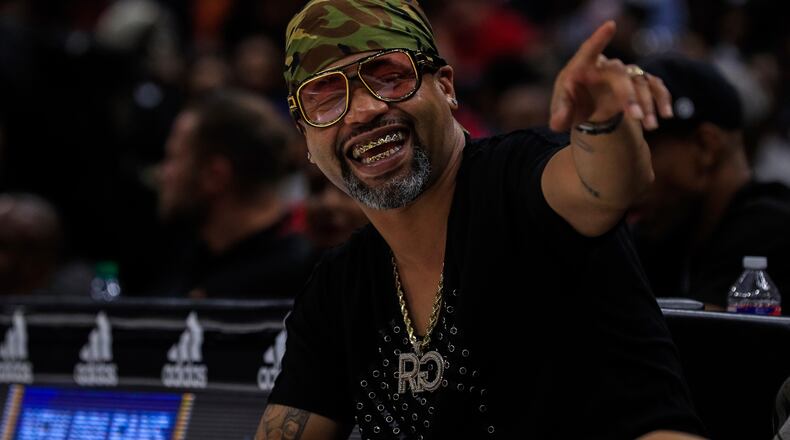In 1999, New Orleans rapper Terius “Juvenile” Gray released “Back That Thang Up.” 25 years later the song has blossomed into a cultural anthem known to jumpstart social functions, special events and even personal moments requiring mood improvement in the form of enthusiastic body movement.
The infectious party jam, which features Lil Wayne and producer Mannie Fresh on vocals, commanded everyone — curvy Black women in particular — to not simply dance but thrust their backsides.
“It’s a twerk song that gets the job done,” Fresh told AJC. “People still show up and act like the song just came out yesterday.”
Credit: Fresh Movement
Credit: Fresh Movement
The second single release from Juvenile’s “400 Degreez” album, “Back That Thang Up” helped introduce rap and pop audiences to bounce music, a regional style of hip-hop with repetitive chants and elastic drumbeats.
To celebrate its impact and staying power, Juvenile and Fresh are performing with the 400 Degreez Band, a New Orleans-based rhythm section, Wednesday at The Eastern. Juvenile said he decided to tour with live musicians at his daughter’s suggestion, following his viral June 2023 appearance on NPR Tiny Desk.
“She was in my ear telling me to change it up and let people know that I’m really singing these songs,” Juvenile told AJC.
Juvenile originally came up with “Back That Thang Up” in 1997. He started reciting the lyrics at block parties in New Orleans and the song become an underground hit, yet it took time for him to be convinced it was worth recording and releasing to listeners outside his hometown.
“I made that song for New Orleans. I just ran with it but didn’t think the song was going to be as big as it was,” Juvenile said.
Credit: Armando Geneyro
Credit: Armando Geneyro
Fresh began his career as a popular New Orleans deejay before becoming the in-house producer for Cash Money Records, the recording label home of Juvenile, Lil’ Wayne and eventually artists like Nicki Minaj and Drake. Fresh said the community’s response to Juvenile’s music was a sign that he could reach a wider audience.
“When he showed up, he was already a neighborhood superstar. He would just do the hook, rap, and people would stop whatever they were doing and run to him,” Fresh said.
The producer matched the rapper’s lyrics with a rhythmic up-tempo music bed. He also wanted to influence listeners to gyrate their bodies from the very beginning of the song, so he added a stirring string arrangement for dramatic effect. The opening six measures of the song also include Juvenile’s declaration of his record company’s dominance, which has proven to have been one of hip-hop’s greatest predictions:
“Cash Money Records takin’ over for the nine-nine and the 2000s...”
The callout not only stands true as a testament of the label’s financial and cultural success, but as a bat signal for those waiting for a cue to put their bodies in motion, according to Fresh.
“The best old-school songs have intros. If you’re at a wedding reception or somewhere talking to somebody, it’s a setup to get to the dance floor before that beat drops down,” he said.
Dino Devaille, an executive at Universal Records, signed Cash Money Records to a distribution deal in 1998. He remembers the label being concerned if the original uncensored song title, “Back That Azz Up,” was too vulgar for mainstream listeners.
“The record had a party vibe, but the company wondered how this was going to get any radio airplay. Then the guys sent me the song’s new title and we had it,” Devaille said.
The song certainly found fans in Atlanta. V-103 announcer Greg Street said he took Juvenile and Fresh to now-closed Atlanta nightclubs like The Bounce on the Westside, Club 559 in West End, and The Gate in Decatur, when they hit the road after the song’s release. Street said those visits showed the song makers how clubgoers were reacting to the music.
“Lil Wayne’s bridge, Juvenile’s verses and the way the beat comes on is great chemistry. People in the club knew it was jamming because you can hear the different elements they put in to make it a special production,” Street said.
Credit: LatishaMariee
Credit: LatishaMariee
Dave Meyers, who directed “Back That Thang Up’s” music video, cast dancers from Juvenile’s live performances in New Orleans. He said Ronald “Slim” Williams, co-founder of Cash Money Records, convinced the director to immerse himself in the city’s culture to give the video authenticity.
“He called, told me to come down to see how the girls do when the song comes on and encouraged me to go into various parts of his neighborhood. It was a wild, fun time,” Meyers remembered.
“Back That Thang Up” peaked at No. 19 on the Billboard pop charts and helped “400 Degreez” sell over 4 million copies. Despite Cash Money Records’ growing popularity, Fresh said he and his labelmates were nervous to perform “Back That Thang Up” outside of the South.
“We had butterflies and jitters going to the East and West Coasts, because they made us feel like they’d never accept our music,” Fresh said. “But when we did the song and saw them rock to it, we knew we’d arrived.”
Credit: LatishaMariee
Credit: LatishaMariee
Juvenile said he assumed the album’s debut single, “Ha,” would be a massive hit but was surprised by “Back That Thang Up’s” runaway success.
“The biggest record is the song I wouldn’t want to be one of my singles, but you really got to let the fans choose,” he said. “It’s hard for the fans to put their hands up when they’re bent over instead. If you want to get the party started and nothing else works, you’ll win if you play that song.”
Sean Falyon, a popular Atlanta deejay who organizes the monthly dance party Sum’n Good, regularly plays “Back That Thang Up” during his sets. He told The AJC the song is a unifier.
“It’s a legendary record and a party staple that brings all types of people together on the floor,” Falyon said. “It brings the high-energy vibes that are nostalgic, build community and celebrate our culture.”
Credit: Fulani G. Jabri
Credit: Fulani G. Jabri
“Back That Thang Up” was even rerecorded in 2021 as “Vax That Thang Up,” a musical public service announcement encouraging social distancing and vaccination against the coronavirus pandemic.
“I had to get their attention and didn’t see any other way. I was tired of being locked inside and wanted my people to be able to go out and be safe,” Juvenile said of his motivation to make the health-conscious remix.
While the 2021 version may have helped lower COVID transmission rates, Juvenile said “Back That Thang Up” also allowed him to have longevity in hip-hop.
“It’s the biggest song of my life, and it will never die. I’ll die before the song will,” Juvenile said.
8 p.m. Wednesday, Nov. 20. The Eastern, 777 Memorial Drive SE, Atlanta. EasternATL.com
Become a member of UATL for more stories like this in our free newsletter and other membership benefits.
Follow UATL on Facebook, on X, TikTok and Instagram.
About the Author
Keep Reading
The Latest
Featured









